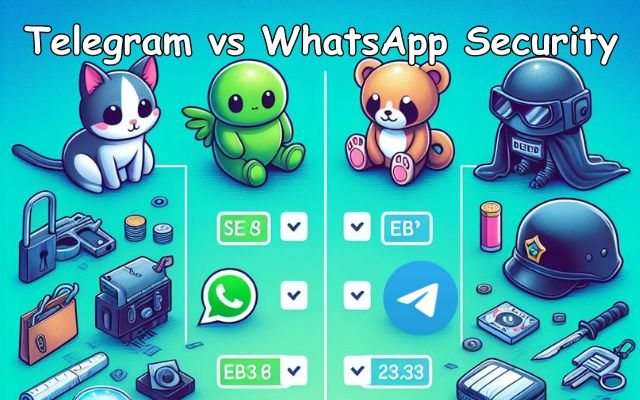Telegram vs WhatsApp Security: Unveiling the Truth

In the digital age, the security of our online communications has become paramount. This article focuses on the Telegram vs WhatsApp security debate, a topic that has garnered much attention in recent years.
WhatsApp and Telegram, two leading messaging apps, have millions of users worldwide. They both promise to offer secure, private communication, but how do they really stack up against each other?
The security features of these apps are often under scrutiny. Users want to know which app will better protect their personal conversations from prying eyes. This article aims to unveil the truth about the security measures employed by Telegram and WhatsApp.
We will delve into the specifics of each app’s security protocols, compare them, and highlight their strengths and weaknesses. By the end of this article, you will have a clearer understanding of which app – Telegram or WhatsApp – provides superior security for its users.
Stay tuned as we unravel the intricacies of Telegram vs WhatsApp security. This comparison will not only enlighten you but also help you make an informed decision about which app to use for secure communication.
Remember, your online security is in your hands, and being informed is the first step towards ensuring it. Let’s dive in!
Understanding Security
In the realm of digital communication, security is a paramount concern. It’s crucial to understand what it entails before we delve into the Telegram vs WhatsApp security comparison.
Security in messaging apps primarily revolves around protecting your personal data and conversations from unauthorized access. This involves various measures such as encryption, two-factor authentication, and privacy settings.
Encryption is a method of converting data into a code to prevent unauthorized access. WhatsApp provides end-to-end encryption for all its messages, meaning only the sender and receiver can read them. Telegram, on the other hand, only offers this feature for its secret chats.
Two-factor authentication is an extra layer of security that requires not only a password and username but also something that only the user has on them, i.e., a piece of information only they should know or have immediately on hand.
Privacy settings allow users to control who can see their online status, profile photo, and more.
As we proceed with our Telegram vs WhatsApp security analysis, we’ll see how these features are implemented in each app and how they contribute to user security.
WhatsApp: An Overview
WhatsApp, officially known as WhatsApp Messenger, is a widely used instant messaging (IM) and voice-over-IP (VoIP) service owned by Meta Platforms. Launched in February 2009, it quickly gained popularity due to its user-friendly interface and robust security features.
As of February 2020, WhatsApp had more than 2 billion users worldwide, making it one of the most popular messaging applications. It allows users to send text, voice messages, and video messages, make voice and video calls, and share images, documents, user locations, and other content.
WhatsApp’s security is built around end-to-end encryption, which ensures that only the sender and receiver can read the messages. This feature is automatically enabled for all conversations, providing users with a secure platform for digital communication.
Despite being acquired by Facebook in 2014, WhatsApp continues to operate as a separate app, maintaining its commitment to providing a fast, reliable messaging service. Its mission is to let people communicate anywhere in the world without barriers.
Now, we will explore Telegram, another popular messaging app, and its security features.
Telegram: An Overview
Telegram, a cross-platform instant messaging app, has been gaining popularity due to its focus on user privacy. Founded by Pavel Durov and his brother Nikolai in 2013, Telegram is registered in the British Virgin Islands, a location favorable for privacy-minded users.
Unlike WhatsApp, Telegram is not owned by any major technology company, and user privacy is at the core of the company’s ethos. Telegram has experienced unprecedented growth over the last few years, with more than 800 million monthly active users as of August 2023.
Telegram offers a variety of features, including end-to-end encryption for secret chats, the ability to delete entire message threads from both devices, self-destructing chats, screen lock, and the option to hide your phone number. However, it’s worth noting that unlike WhatsApp, Telegram does not have end-to-end encryption for all its messages.
In addition to these security features, Telegram introduced Telegram premium in 2020, a paid version of the app that offers additional features. This move was part of Telegram’s ethos to keep the company independent and not reliant on any major tech company.
Comparing Security Features: WhatsApp vs Telegram
When it comes to the Telegram vs WhatsApp security debate, it’s essential to understand the unique security features each platform offers.
| Feature | Telegram | |
|---|---|---|
| End-to-End Encryption | Available for all chats | Available only for secret chats |
| Chat Backups | Not end-to-end encrypted | No automatic backups |
| User Privacy | Shares some user data with Meta | Does not share data with third parties |
| Security Breaches | Has had several reported incidents | Fewer reported incidents |
| Unique Features | None | Secret chats, self-destructing messages, ability to hide your number, cloud-based storage |
End-to-End Encryption
WhatsApp provides end-to-end encryption for all its messages, meaning only the sender and receiver can read them. This feature is automatically enabled for all conversations.
On the other hand, Telegram only offers end-to-end encryption for its secret chats. For regular chats, Telegram uses client-server/server-client encryption. This means that your messages are encrypted between your device and Telegram’s server, and then again between Telegram’s server and the recipient’s device.
Chat Backups
WhatsApp creates automatic backups of your chats, but these backups are not end-to-end encrypted. This means that if someone gains access to your backup files, they could potentially read your messages.
Telegram, however, does not create automatic backups. All your messages are stored on their servers and are encrypted. If you delete your account or the app, all your messages will be deleted from their servers.
User Privacy
WhatsApp has come under scrutiny due to changes in its privacy policy. The app shares some user data with its parent company, Meta. However, this does not include the content of your messages due to end-to-end encryption.
Telegram, being independent and not owned by any major tech company, places user privacy at the forefront of its operations. It does not share user data with third parties.
Security Breaches
Both WhatsApp and Telegram have had their share of security breaches. In recent years, there have been reports of vulnerabilities in both apps that could potentially allow hackers to gain access to user data. Both companies have taken steps to address these issues and enhance their security measures.
Both WhatsApp and Telegram offer robust security features, but they approach user privacy and data security differently. While WhatsApp provides end-to-end encryption for all messages, its chat backups are not encrypted, and it shares some user data with Meta. Telegram, on the other hand, prioritizes user privacy, does not share data with third parties, and stores all messages on its servers with encryption. However, it only provides end-to-end encryption for secret chats.
Case Studies
In the realm of digital communication, security breaches are unfortunately a common occurrence. Let’s look at some recent incidents involving WhatsApp and Telegram to understand the real-world implications of these security issues.
In 2019, WhatsApp confirmed a major vulnerability that allowed hackers to remotely install surveillance software on phones and other devices. The attack targeted a “select number” of users and was orchestrated by “an advanced cyber-actor”. WhatsApp rolled out a fix to address this issue.
In another incident, researchers discovered a flaw in the web versions of WhatsApp and Telegram. The vulnerability could expose data, contacts, and more. Attackers could send an innocent-looking image file containing malicious code to users. If the user clicked on the image, the attacker could gain full access to WhatsApp or Telegram local storage data, which includes user account information.
Telegram
Telegram, while not immune to security breaches, has had fewer reported incidents compared to WhatsApp. However, it’s important to note that Telegram’s security is often under scrutiny due to its optional end-to-end encryption feature.
These case studies highlight the importance of staying informed about the latest security updates and practices. Users should regularly update their apps to the latest version to benefit from the most recent security patches and improvements.
FAQ: Telegram vs WhatsApp Security
Is Telegram really safer than WhatsApp?
Telegram and WhatsApp both offer secure messaging services, but they handle user data differently. Telegram uses server-client encryption for regular chats and end-to-end encryption for secret chats. However, WhatsApp applies end-to-end encryption to all chats by default. Some users feel that Telegram’s approach to user privacy makes it a safer choice.
How secure is Telegram really?
Telegram’s security depends on the type of chat. Regular chats use server-client encryption, while secret chats use end-to-end encryption. However, all messages are decrypted on Telegram’s servers in regular chats, which some users see as a potential vulnerability.
Why does Telegram have more features than WhatsApp?
Telegram offers several unique features not found in WhatsApp. These include secret chats, self-destructing messages, the ability to hide your number, and cloud-based storage. Telegram also supports large group chats and has its own Bot API.
Which is more secure, Signal or WhatsApp?
Both Signal and WhatsApp use end-to-end encryption, but Signal is often considered more secure. This is because Signal encrypts metadata, doesn’t share data with third parties, and is owned by a non-profit organization.
Is Telegram safe for sending private photos?
Telegram’s secret chats, which use end-to-end encryption, can be used to safely send private photos. These chats also offer a self-destruct timer for messages, adding an extra layer of security.
What is safer than Telegram?
Signal is often recommended as a safer alternative to Telegram. It offers end-to-end encryption by default and doesn’t share data with third parties.
Why did people switch from WhatsApp to Telegram?
Many users switched from WhatsApp to Telegram due to concerns over WhatsApp’s 2021 privacy policy, which allows it to share certain data with Facebook. Telegram’s focus on privacy and its unique features have attracted these users.
What are the disadvantages of Telegram?
Despite its features, Telegram has some disadvantages. It has a smaller user base compared to other platforms. Some features are not available across all platforms. Also, while it offers end-to-end encryption, it’s not enabled by default.
Conclusion: Telegram vs WhatsApp Security
After a comprehensive analysis of the Telegram vs WhatsApp security features, it’s clear that both platforms have their strengths and weaknesses.
WhatsApp, with its end-to-end encryption for all messages, offers robust security for user conversations. However, its chat backups are not encrypted, and it shares some user data with its parent company, Meta. These factors have raised privacy concerns among some users.
Telegram, on the other hand, prioritizes user privacy and does not share data with third parties. It offers end-to-end encryption for secret chats, but not for all messages. This selective approach to encryption has been a point of contention among security experts.






